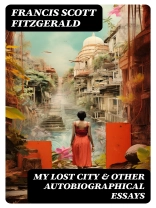In ‘My Lost City & Other Autobiographical Essays, ‘ Francis Scott Fitzgerald offers a poignant reflection on the American experience during the Roaring Twenties, capturing the blend of personal nostalgia and social critique that defined this dynamic era. This collection presents Fitzgerald’s signature lyrical prose and keen eye for detail, illuminating both the exuberance and disillusionment of his contemporaries. The essays explore themes of ambition, love, and loss, rooted in Fitzgerald’s own experiences in New York City, and expose the complexities of a nation on the brink of transformation, making it a vital addition to the American literary canon. Fitzgerald, one of the foremost chroniclers of the Jazz Age, sought to articulate the contradictions of wealth and disenchantment that permeated his life and society. His tumultuous relationship with Zelda Sayre, his literary aspirations, and the pervasive impact of societal change influenced the essays in this collection. Drawing from his autobiographical lens, Fitzgerald portrays not only his personal circumstances but also the larger cultural dynamics at play during a critical period in American history. Readers seeking to understand the intricate interplay between personal narrative and historical context will find ‘My Lost City & Other Autobiographical Essays’ an invaluable resource. Fitzgerald’s evocative language and introspective insight urge readers to reflect on their own dreams and disillusionments, making this collection a compelling and timeless exploration of the human experience.
Про автора
Francis Scott Key Fitzgerald, celebrated American novelist and short story writer, is widely regarded as one of the finest authors of the 20th century, notable for his depiction of the Jazz Age—a term he is credited with coining himself. Born on September 24, 1896, in St. Paul, Minnesota, Fitzgerald’s literary prowess was evident from an early age, and he honed his craft at Princeton University, though he never graduated. His breakthrough came with ‘This Side of Paradise’ (1920), which instantly made him famous. Fitzgerald’s most acclaimed novel, ‘The Great Gatsby’ (1925), remains a seminal work in American literature, lauded for its exploration of decadence, idealism, and the fallacies of the American Dream. His other notable works include ‘The Beautiful and Damned’ (1922) and ‘Tender is the Night’ (1934). Besides novels, Fitzgerald was a master of the short form, as displayed in ‘My Lost City & Other Autobiographical Essays, ‘ which provides insight into his life and times, reflecting his personal struggles and the ebbs and flows of his career. His lyrical style, marked by a keen social insight and a plaintive melancholy, captures the spirit of an era and the complexities of the human condition. Despite his literary success, Fitzgerald battled personal demons, struggling with alcoholism and financial difficulties. He died on December 21, 1940, leaving behind a legacy that continues to influence writers and culture to this day.












